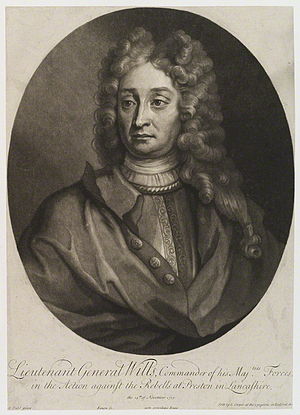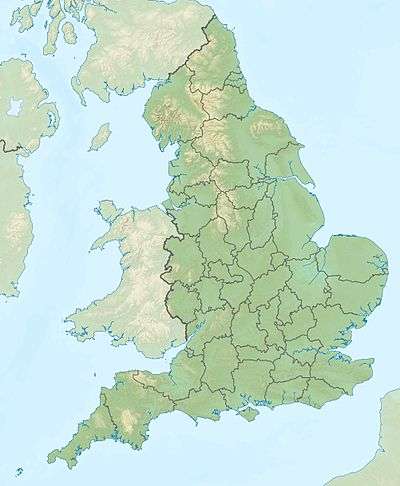Battle of Preston (1715)
The Battle of Preston (9–14 November 1715), also referred to as the Preston Fight, was fought during the Jacobite Rising of 1715 (often referred to as the First Jacobite Rising, or Rebellion by supporters of the Hanoverian government).
- See Battle of Preston (1648) for the battle of the Second English Civil War.
Background
The Jacobites moved south into England with little opposition, and by the time they reached Preston in Lancashire had grown to about 4,000 in number. Their horse troops entered Preston on the night of 9 November 1715, and as they approached two troops of dragoons and part of a militia regiment retreated to Wigan.
General Charles Wills was ordered to halt their advance, and left Manchester on 11 November with six regiments, arriving on the 12th. The Jacobite leader Thomas Forster, a Northumberland squire, had intended to move on that day, but, learning of Wills's approach, decided to stay and made the mistake of withdrawing troops from a strong defensive position at Ribble bridge, 0.5 miles (0.80 km) outside Preston.j
Battle
The Jacobites had barricaded the principal streets of Preston, and Wills ordered an immediate attack, which met with fire from the barricades and from houses, resulting in the Hanoverian attack being repulsed with heavy losses. Wills then had houses set on fire, with the aim of fires spreading along to the Jacobite positions, and the Jacobites tried to do the same to houses taken as government positions. At night, Wills's order to light the government-held positions for identification helped the Jacobite snipers, but overnight many Jacobites left the town. The legend of these actions is recounted in a well-known Lancashire ballad, Lo! The Bird is Fallen.[1]
On the morning of Sunday 13 November more government forces arrived and, finding that the town was insufficiently encircled, Wills stationed more troops to prevent the besieged Jacobite army from escaping. The Jacobites had also suffered losses in the fighting, as well as losing defectors overnight, and although the Highlanders' full intention was to fight on and take the attack to the enemy, Forster agreed to an offer from his officer Colonel Oxburgh to open negotiations with Wills for capitulation on favourable terms. This was done without informing the Highlanders, but Wills refused to treat with rebels. When the Highlanders learned of this that night, they were infuriated and paraded the streets threatening any Jacobites who might even allude to a surrender, killing or wounding several people.
At seven o'clock on the morning of Monday 14 November, Forster offered an unconditional surrender, which was turned down unless it applied to the Highlanders. Forster then sent back confirmation that the Scots noblemen would surrender on the same terms. When the government forces entered the town, the Highlanders were drawn up under arms in the market-place ready to surrender.
Aftermath
1,468 Jacobites were taken prisoner, 463 of them English. George Seton, 5th Earl of Winton, William Gordon, 6th Viscount of Kenmure, William Maxwell, 5th Earl of Nithsdale, James Radclyffe, 3rd Earl of Derwentwater, and William Murray, 2nd Lord Nairne, were among those captured and later sentenced to be executed for treason under an act of attainder. However, Winton and Nithsdale escaped from the Tower of London. All surviving prisoners except for members of the Clan Gregor were later pardoned by the Indemnity Act 1717.
Seventeen Jacobites were killed and twenty-five wounded. Government casualties were close to 300 killed and wounded.[2] Of the ordinary Highland clansmen captured at the Battle of Preston, many were transported to the Americas.[3]
Last battle on English soil
The battle of Preston is often claimed to have been the last fought on English soil, but this depends on the definition of "battle", for which there are different interpretations. Preston was a siege rather than a pitched battle, so the Battle of Sedgemoor fought in 1685 is also a contender for the title of the last battle, as is the skirmish at Clifton Moor near Penrith in Cumbria on 18 December 1745 during the 'Forty-Five' Jacobite rebellion. However, there was a great deal of savage fighting in streets all over the town during the Battle of Preston, far more than in most sieges. It was as much of a battle as, for example, the Battle of St Albans (1455) in the Wars of the Roses, which was also fought in the streets of a town, but which is generally regarded as a battle and not a siege, as is the Battle of Reading of 1688. The Battle of Bossenden Wood, fought on 31 May 1838, is a much later contender.
See also
- Battle of Sheriffmuir, a concurrent battle of the 1715 Rising fought in Scotland
External links
References
- "Archived copy". Archived from the original on 2 March 2012. Retrieved 2010-01-05.CS1 maint: archived copy as title (link)
- The best discussion of this is by the historian and military expert J. Baynes in his The Jacobite Rising of 1715 (1970), pp. 126–127.
- Mackintosh Archived 19 March 2007 at the Wayback Machine at myclan.com
Bibliography
- Baynes, J. (1970). The Jacobite Rising of 1715. pp. 126–127.


.svg.png)